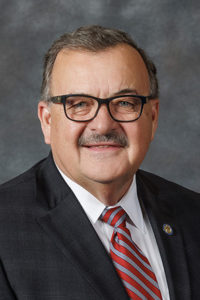Hospital assessment program clears first round
A bill intended to increase Medicaid payments to Nebraska hospitals without the use of additional general fund dollars was amended and advanced to select file Feb. 15.

LB1087, introduced by North Platte Sen. Mike Jacobson, would require the state Department of Health and Human Services to submit a state plan amendment to the Centers for Medicare and Medicaid Services for approval to impose an assessment on Nebraska hospitals.
Under the plan, each Nebraska hospital would pay an assessment fee based on their quarterly net patient revenue. The total statewide assessment amount could not exceed 6% of the total net patient revenue of all assessed hospitals.
Jacobson said the bill would allow Nebraska to access a federal program used by 43 other states and the District of Columbia that provides matching funds to help hospitals cover the cost of treating individuals on Medicaid.
For each dollar assessed under the program, he said, the federal match in Medicaid directed payments would be approximately $2.19 — a total of approximately $1 billion per year. Those dollars would be distributed to Nebraska hospitals based on their share of Medicaid patients treated in both inpatient and outpatient settings.
The majority of Nebraska hospitals are losing money on operations, Jacobson said, including 59% of small, rural critical access hospitals. Several of those hospitals have closed labor and delivery units, hospital-owned nursing homes and behavioral health, hospice and home health services, he said.
“[LB1087] presents a lifeline to Nebraska hospitals and the people they serve,” Jacobson said. “If passed, this bill would increase and improve access to quality care across the state and give us measurable results for all Nebraskans.”
A Health and Human Services Committee amendment, adopted 39-0 replaced the bill. The contents of that amendment were in turn replaced by an amendment offered by Jacobson and adopted 34-3.
As amended, LB1087 would be administered by DHHS, which would receive an administration fee of 3% of the assessment amount, not to exceed $15 million. Of the total assessed amount, 3.5% could be used for health priorities including funding non-hospital Medicaid rates for physicians, dental care, behavioral health services or increased rates for nursing homes, among other priorities. That amount would be capped at $17.5 million annually.
The amendment also would eliminate the bill’s original fiscal note of more than $400 million by changing the timing mechanism for how Medicaid directed payments would be paid to the state’s hospitals and would terminate the program Dec. 31, 2026.
Jacobson said the termination provision was part of a negotiation between the state’s hospitals and the executive branch.
Several lawmakers, including Sen. Myron Dorn of Adams, expressed concerns about the sunset date, noting that it might not provide the state enough time to establish such a complex program and have sufficient data to evaluate it properly.
“When we set in motion a program like this, especially … a Medicaid program, it’s not one where tomorrow we turn a switch on [and] now it’s up and going,” Dorn said. “It’s going to take time.”
Sen. Danielle Conrad of Lincoln echoed those concerns when explaining her vote against the Jacobson amendment. She said she strongly supported the underlying bill – calling it a “commonsense” solution to the challenges facing the state’s hospitals – but warned against ceding control over programs that the Legislature creates by giving “too much deference” to the executive branch.
“[The amendment] unnecessarily and needlessly weakens a really smart, strong policy solution that essentially there is very, very strong support for,” Conrad said.
Jacobson agreed with those concerns, but said the sunset provision was negotiated “in good faith” and that he intended to keep his word.
“Do I agree with the sunset? No,” he said.
Sen. Ben Hansen of Blair supported the sunset provision. States rarely discontinue a program once it’s established, even if the federal government alters program requirements in ways that lawmakers disagree with, he said.
“I’ll bet the farm on it that … we’re not going to give up that money,” Hansen said. “This is a growing concern I’ve had for the six years that I’ve been here.”
Following adoption of the amendments, lawmakers voted 40-0 to advance LB1087 to select file.


